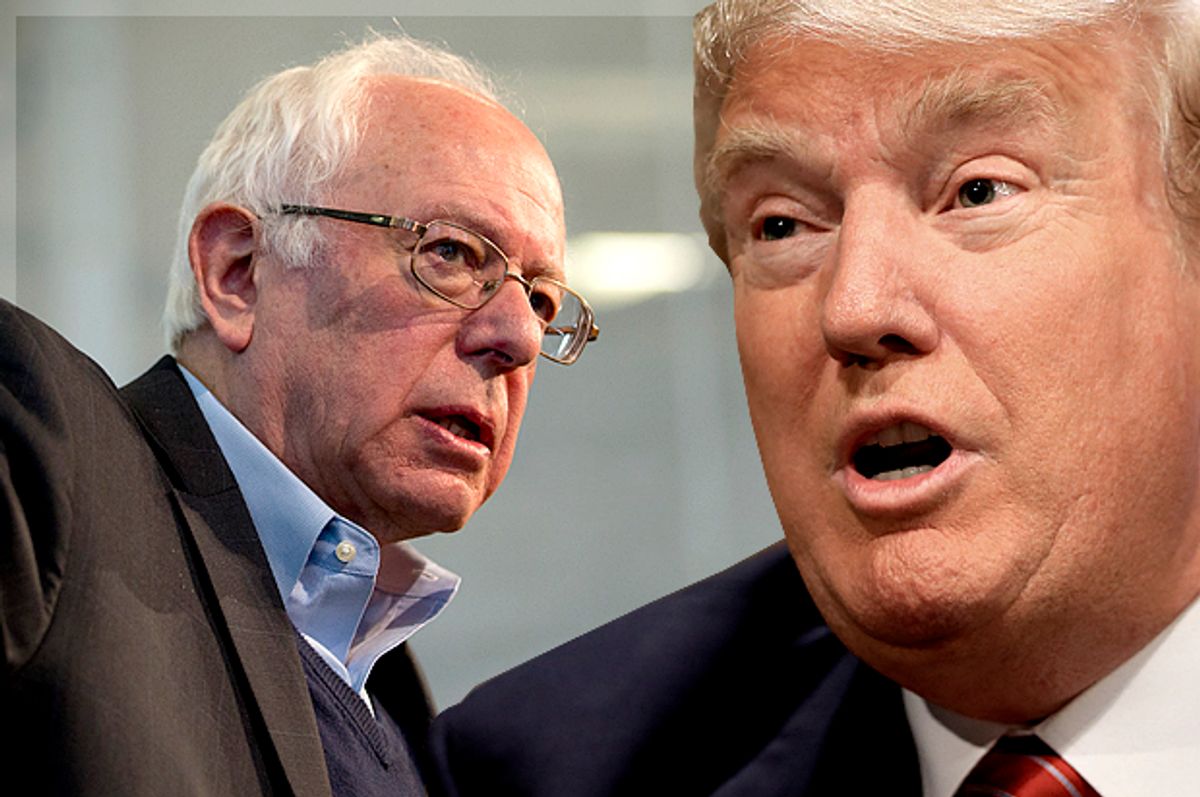It’s primary day in New Hampshire, which means that we all get to sit around and excitedly wait to find out how the polling industry has failed us once again. There are fewer candidates to kick around this time and the outcomes in both the Republican and Democratic races seem far less uncertain than they did heading into Iowa, but there’s still spin to be had and consequences to be prognosticated, so here we go.
Let’s start with the Democrats. New Hampshire has been Bernie Sanders’ strongest early state for months now, and he heads into today with a 13-point lead in the polling averages. That advantage has narrowed a tiny bit since Hillary Clinton’s impossibly narrow victory in the Iowa caucus, but right now everything still points to a Sanders win.
We know how the Sanders campaign will react to a New Hampshire victory – the big question is how Hillary Clinton will react to losing. Much will depend on how big the margin is. If Clinton manages to replicate something similar to what happened in 2008, when she erased a huge polling deficit to eke out a slim win over Barack Obama, then she’ll have something to spin and celebrate. The odds of Hillary winning outright are not good – less than a 1 percent chance, per FiveThirtyEight’s forecast – but if she turns in an unexpectedly close race then she can pull a Rubio and try convincing people that a narrow defeat is just as good as a win.
Should she get blown out in the way that the poll averages suggest she might, then things could get ugly. Politico reported yesterday that the “staff shakeup” every flailing campaign goes through is in the works for Team Clinton post-New Hampshire. This is an exact repeat of what happened in 2008, when it looked like they were going to get creamed in the state and starting feeding reporters rumors of major staff changes the day before voting started. According to Politico, the campaign is struggling from a too-many-cooks situation at the top with strategic guidance being absorbed from outside the campaign, courtesy of the familiar coterie of Clinton hangers-on: Sid Blumenthal, Terry McAuliffe and even Hillary 2008 pariah Mark Penn.
Assuming the “shakeup” actually happens (Hillary brushed off the report in an interview with Rachel Maddow, but also said “we’re going to take stock, what works, what doesn’t work”) it’s not too difficult to guess what direction the Clinton campaign would take. They’ve been telegraphing it for a week now: Things are going to get a bit nastier. At last week’s debate, Hillary accused Bernie’s campaign of perpetuating an “artful smear” about her ties to Wall Street. Bill Clinton went on the attack over the weekend, calling Sanders out of touch with reality. And Clintonland surrogates are previewing their plans to rough Bernie up ideologically.
As they (maybe?) learned in 2008, there are risks to going that route – you can go too far in attacking your idealist opponent and then your negativity becomes the story. And they might consider holding off on a “shakeup” given that the electoral map becomes much more favorable to Hillary starting tomorrow, with contests in states like Nevada and South Carolina where the voting demographics give her an edge. If she’s still leading in those states, then there’s no real upside to a dramatic campaign disruption of the sort hinted at by the Politico report.
On the Republican side, it looks like tonight will finally be Donald Trump’s night. He’s leading comfortably in all the polls, and while the same was true going into Iowa, he has a much bigger cushion in New Hampshire and his campaign doesn’t have to contend with the arcane caucusing process this time around. It is certainly possible that the polls have it all wrong once again, but no one has been within 10 points of Trump in New Hampshire since mid-January. As of last night, Trump’s chances of winning stood at 75 percent, per FiveThirtyEight. If/when Trump wins, there will be pandemonium, because he, Donald Trump, will have just won an election contest.
But the more interesting question is what will become of Marco Rubio. Post-Iowa, the Florida senator shot up in the polls from the high single digits to the mid-teens, but then got thumped in this past weekend’s debate and started declining. Right now he is within 4 points of John Kasich, Ted Cruz and Jeb Bush, which is not really where he wants to be. The Rubio 3-2-1 strategy envisioned the other “establishment lane” candidates fading while he snapped up a strong silver medal in New Hampshire, at which point they would all drop out and the party would consolidate behind Rubio in a three-man race against Cruz and Trump in South Carolina. If he barely scrapes out a second-place finish ahead of Kasich and Bush, they’re much less liable to clear the way for Rubio.
Anything less than second place would be big trouble for Rubio, given that the media have been primed for his collapse and the degree to which he’s hyped his own electability and strength. If Kasich takes second, he’ll have every reason to continue on to South Carolina (along with Jeb, most likely) and keep competing with Rubio for “establishment lane” votes in a state that, by Rubio’s own strategy, is a must-win. If Cruz somehow sneaks in ahead of Rubio, he’ll spin that as a major coup in a state that is not supposed to be friendly territory for him.
Of course, it’s also possible that Rubio could still get the strong second-place finish he was angling for, in which case the media will go back to treating him gently as the well-spoken extremist that he is. He’ll still face tremendous difficulty in prying South Carolina from Trump’s and Cruz’s fingers, but the risky 3-2-1 gamble will, for a little while longer, remain intact.

Shares